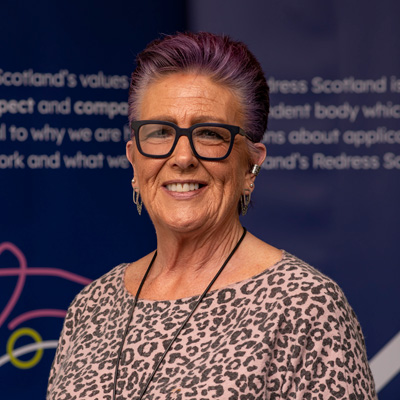In this instalment of our Redress Scotland Panel Members Voices series, we speak to Dr Anne Houston OBE about her prolific career and hear her advice to those considering applying to the redress scheme.
Anne has dedicated her working life to supporting children in Scotland and the UK. After qualifying as a social worker in 1980, she spent the following decade working with children in care and running a therapeutic community for young adults – many of whom were survivors of abuse.
In 1990 she was involved in setting up ChildLine Scotland, where she went on to serve as the director before becoming deputy CEO of ChildLine UK. While at ChildLine, she set up a dedicated helpline for children in care in Scotland.
Anne then served as the CEO of Children 1st until her “retirement” in 2014, although it has been almost as busy as her career. She has held multiple voluntary positions – including serving as the vice chair of the Care Inspectorate and chair of Child Protection Committees Scotland. Continuing her work of advocating for and supporting survivors, she became a Redress Scotland panellist in November 2021.
Anne’s extensive expertise gives her insight into survivors’ needs. For her, the most important thing is that survivors feel supported and believed at every step of the healing process.
She says:
“The Redress scheme was designed in such a way that it puts survivors and their loved ones at the heart of all we do, and especially our decision making. As a panel community, we are very aware of that and ensure that the feelings and experiences of survivors are heard and taken seriously. It is a safe space for them to express the horrors they have experienced as children without being judged or blamed, and importantly, minimising the need for them to relive experiences that could potentially retraumatise them.
“For many, this is a new experience – for them to know that we can bear to hear what they have experienced and still respect them. We know money won’t make the experiences of the past – or the trauma experienced by some to this day – go away but might go a little way in making the rest of their – or their nearest and dearest’s lives – better.”
To survivors or next of kin considering making an application, she has this message:
“This can’t make the hurt disappear, but hopefully can help you feel really heard and respected for your courage in telling us about your experience. Redress funding can hopefully go a small way toward giving you more choices in how you might want the rest of your life to be. Sharing your experiences can also help to ensure it doesn’t happen to others, which is a legacy.”
Above all, Anne feels privileged to be supporting the redress scheme and appreciates the trust survivors place in her by sharing their stories.
“I feel lucky at this stage in my working life to do something that feels worthwhile and that links to the work I have cared about most in my life.”

